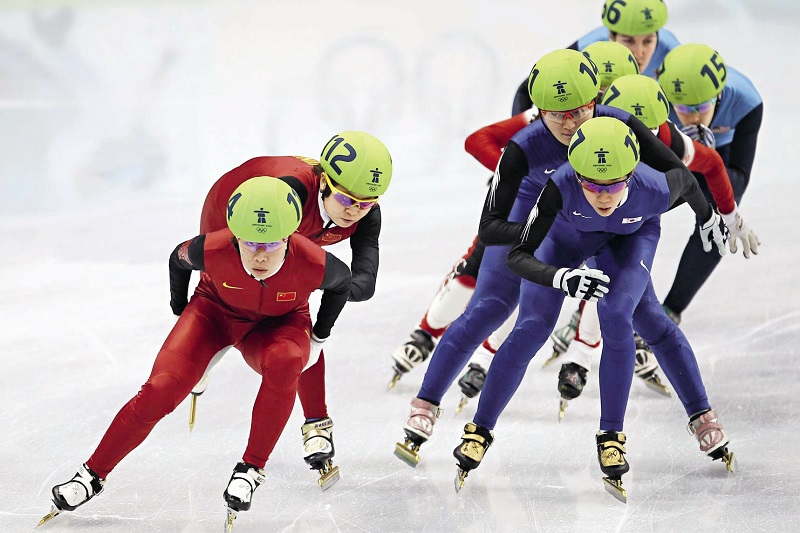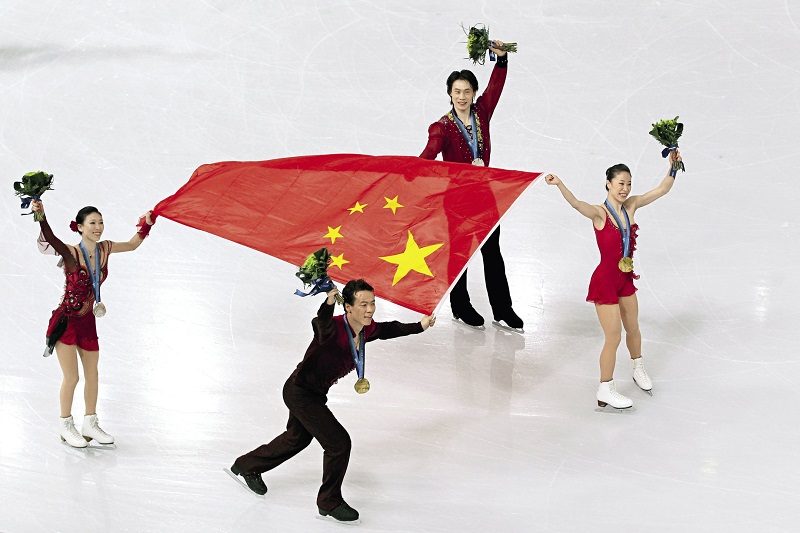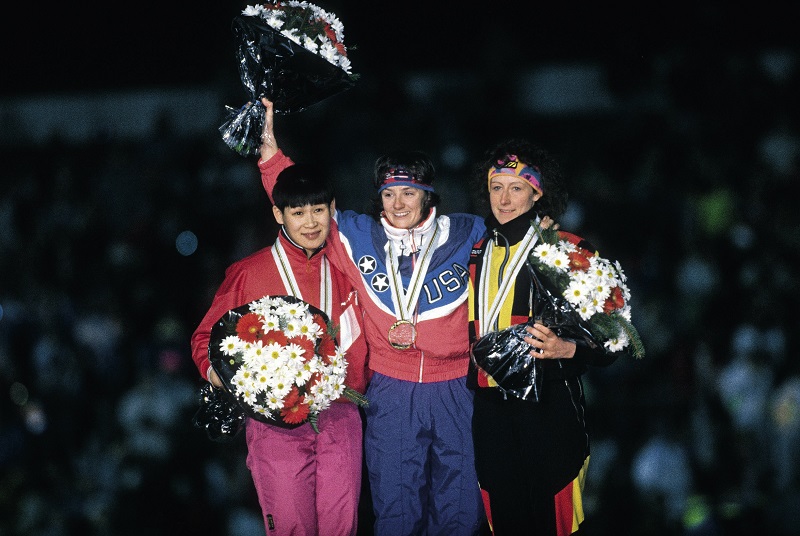The past four decades witnessed the long journey China's ice and snow sports have gone through.

China wins the women’s 3,000m short track speed skating relay final at the 2010 Vancouver Winter Olympic Games at Vancouver Pacific Stadium on February 24, 2010.
One day in October 1978, Ye Qiaobo, a 14-year-old speed skater, along with members of the PLA Bayi Sports Work Brigade, set off to train in cities across northeast China that included Heihe, Nenjiang, Hailar and Qiqihar in a big convertible Jiefang truck.
Two months later, the transforming decision of reform and opening-up was passed by the Third Plenary Session of the 11th Central Committee of the CPC, a milestone in new China’s history, which also created opportunities for the development of ice and snow sports in the country. Ye went on to become China’s first Winter Olympics medalist 14 years later.
Debut at the Winter Olympic Games
In 1979, China resumed its legitimate membership on the International Olympic Committee (IOC). In February 1980, the Chinese winter sports delegation went abroad for the first time to participate in the 13th Winter Olympic Games held in Lake Placid, the U.S. However, as skating and skiing back then were marginal sports in China, the lack of experience and poor equipment made China’s first Winter Olympic journey short-lived. But it was still meaningful. For the first time, Chinese ice and snow athletes stepped onto an international sports stage, and the five-star red national flag flew in the Olympic stadium.
Four years later in February 1984, the 14th Winter Olympics, held in Sarajevo, Yugoslavia, was unprecedented in scale, with a total of 1,410 athletes from 49 countries and regions participating. This time, Chinese athletes improved their performance.
New sports were added to the 1988 Winter Olympics in Calgary, Canada, extending the competition to 16 days. However, as China did not qualify for ice hockey, and was not good at alpine skiing, ski jumping or the modern biathlon, it only sent a 20-member delegation to compete in three sports. That year, during the exhibition match of women’s short track speed skating, Li Yan won a gold medal in the 1,000 meters and bronze medals in the 500 and 1,500 meters respectively, but there were still no gold medals in the official competition.
In 1992, 12 years after entering the Winter Olympics, a Chinese delegation of 34 athletes took part in 34 events including skiing, skating and the biathlon at the 16th Winter Olympics held in Albertville, France. Ye Qiaobo came second in the women’s 500-meter speed skating in 40.51 seconds, winning China its first Winter Olympics medal.
Recalling the competition 29 years ago, Ye is still full of regrets today, “It was so close! I almost got the gold medal if I hadn’t had an accident in the lane changing area. I was both excited and regretful!” After that, she went on to win a second silver medal in the 1,000-meter race despite being injured. Ye returned home in a wheelchair, inspiring people across the country. Also, in this Winter Olympics, Li Yan won a silver medal in the women’s 500-meter race. Chen Lu came sixth in figure skating, the best ever achieved by a Chinese delegation in this event.
After the 1992 Winter Olympics, the IOC introduced a new winter Olympic cycle to avoid being in the same year with the Summer Games. Two years later, the 17th Winter Games was held in Lillehammer, Norway.
At the age of 17, Chen Lu performed a complete set of seven triple jumps in women’s figure skating, and went on to win the first Olympic medal of this event for China with her elegant performance, which captivated the audience.
At the same Olympics Ye Qiaobo won the bronze medal in the women’s 1,000-meter speed skating. Zhang Yanmei, a short track speed skater, who could have won the gold medal in women’s 500 meters, finished second after an unfair penalty. In addition, a total of eight Chinese athletes ranked among the top eight in five events, marking a comprehensive breakthrough of China in ice sports.
At this point, the Chinese team was beginning to gain some experience. At the Nagano Winter Olympics in 1998, the Chinese delegation hit a new high, with a total of 60 players taking part in 40 events, winning six silver and two bronze medals, elevating China to 16th in the medal tally. In the women’s freestyle skiing aerials finals, Xu Nannan won silver with 186.97 points, a breakthrough in skiing for China. Chen Lu claimed another hard-won bronze medal in the women’s figure skating singles, with a highly technical, superb performance.
Short track speed skating became the biggest winner of the Chinese delegation at this Olympics, with medals in each of the six men’s and women’s events. In the women’s 3,000-meter relay, Yang Yang and her teammates won the silver medal. Yang Yang went on to win two more silvers in the women’s 500 meters and 1,000 meters.
Li Jiajun, who was in poor health, won a silver medal in the men’s 1,000-meter race, becoming the first male winter medalist of the Chinese delegation. The 17-year-old An Yulong also won a silver medal in the men’s 500 meters. In addition, he and his teammates won a bronze medal in the 5,000-meter relay, against the established teams of Canada and Italy.
In Nagano, the Chinese delegation won the most medals since its participation in the games in 1980. Though there were no gold medals, it was a great leap forward.

Shen Xue/Zhao Hongbo, Pang Qing/Tong Jian raise China’s five-star red flag to celebrate the gold and silver medals they got respectively at the 21st Winter Olympic Games on February 15, 2010, in Vancouver of Canada.
24 Years of Efforts Bore Fruit
Twenty-four years after China’s implementation of the reform and opening-up policy, China’s winter sports games ushered in a glorious moment. At the 2002 Salt Lake City Winter Olympics, Yang Yang won the first gold medal for the Chinese delegation in the women’s 500-meter short track speed skating with a time of 44.187 seconds, realizing the dream of several generations of Winter Olympic athletes.
At the 2006 Turin Winter Olympics, the number of Chinese athletes in snow events exceeded that in ice events for the first time. The freestyle aerials team was the most competitive. Han Xiaopeng, who only came in 24th in previous games, performed exceptionally in the men’s aerials event and won China an unexpected gold medal. This was the first time an Asian freestyle skier ever won a gold medal at the Winter Olympics, and also a breakthrough in China’s snow sports.
The Chinese women’s aerialist team had a new star, Li Nina, a hot prospect for a gold medal, along with Guo Xinxin, Xu Nannan and Wang Jiao, who all had performed very well in the World Cup. Despite being disappointed at winning a silver medal, Li Nina and the other above-mentioned athletes all ranked among the top 12 finalists, showing strong overall improvement.
Besides, though China’s figure skating pair did not win a gold medal, all three pairs made it to the final four. The 21-year-old Zhang Dan and Zhang Hao overcame injuries to win the silver medal, while Shen Xue and Zhao Hongbo overwhelmed the judges with their determination and artistic expression, ending up with a bronze medal. Another pair, Pang Qing and Tong Jian, also performed their personal best, finishing fourth.
The short track speed skating team was still the biggest medal winner of the Chinese team, with one gold, one silver, and three bronze medals at the Turin Winter Olympics. In the women’s 500-meter race, China’s dominant event, the overwhelming Wang Meng and her teammates won China a gold medal, holding off Bulgaria’s Evgenia Radanova. Meanwhile, Wang also won the silver medal in the women’s 1,000 meters and the bronze medal in the women’s 1,500 meters, becoming the only Chinese athlete to win three medals. Li Jiajun, a 31-year-old veteran, won a bronze medal for China in the men’s 1,500 meters final.
At the 2010 Vancouver Winter Olympic Games, the Chinese delegation won five gold medals, two silver medals, and four bronze. Yang Yang and Wang Meng set off a China storm, sweeping all four individual gold medals in women’s short track speed skating, an unprecedented Grand Slam. Wang not only successfully defended the 500 meters title, but also won the 1,000 meters gold medal. Then, Wang, together with Zhou Yang, Sun Linlin, and Zhang Hui, won the women’s relay in four minutes and six seconds, setting a world record.
With four gold medals in a total of six medals, Wang became the first Chinese athlete to win this number of medals in a single Winter Olympics. Meanwhile Zhou Yang defeated three South Korean competitors to win the women’s 1,500 meters finals.
Not to be outdone, the figure skating team also created history. The retired pair of figure skaters and also husband and wife Zhao Hongbo and Shen Xue, who were competing in their fourth Winter Olympics, returned in Vancouver. Their mesmerizing performance earned them a long standing ovation from the audience. They scored 139.91 points in the free skate and set a new international record, making them well-deserved champions. Another pair of Pang Qing and Tong Jian won China a silver medal, while Zhang Dan and Zhang Hao finished fifth.
Zhang Hong made China’s speed skating history by winning the gold medal in the 1,000-meter event at the 2014 Sochi Winter Olympics, while Wu Dajing, a short-track speed skater, won the only gold medal for China at the 2018 Winter Olympics in Pyeongchang, the Republic of Korea, despite unfair penalties against Chinese athletes.

China’s Ye Qiaobo (left) receives the silver medal at the women’s speed skating 500m final in Albertville of France on February 10, 1992.
Beijing Winter Olympics – a Big Leap Forward
Alongside the economic miracle China has achieved since 1978, its winter sports have also become competitive in the world. In 2015, China won the bid to host the 2022 Winter Olympics, ushering in another historical opportunity for further progress.
China now boasts 703 ski resorts, 250 indoor ice rinks, and 15.7 million skiers. Zhao Yinggang, former director of the Winter Sports Administration Center of the General Administration of Sport of China (GASC), said, “As China starts to pay more attention to snow and ice sports, there will be increased financial support. As a result, our athletes will compete abroad more often and their skills will improve, which means they will be recognized and accepted more by the world.”
After waiting for nearly 100 years, the 2022 Winter Olympics has finally come to China, which not only raises expectations of the Chinese people, but also marks the beginning of China becoming a major country in ice and snow sports. Zhangbei County, once a desolate area, has witnessed explosive growth in ski field construction, driven by the upcoming Winter Olympics and has now become a world-class ice and snow sports venue in Asia.
In 2015, when Beijing won the bid, many events were still vacant in China. After three years of preparation, at the 2018 Pyeongchang Winter Olympics the Chinese delegation took part in 55 events, the most in its history.
In order to implement Xi Jinping’s instructions on the 2022 Winter Olympics, which include to participate in as many events as possible, the GASC has proposed a plan to encourage the Chinese delegation to participate in every one of the 109 events, and to select the best athletes from across the country. With great efforts made, 31 training teams covering all 109 events were formed.
In order to prepare well enough for the Beijing Winter Olympics, the GASC put forward a strategic plan. Through internal competitions, delegation candidates have been reduced from 4,000 to 1,153, forming a more competitive team. Now the national training teams have won more medals in international competitions in recent seasons than ever before.
Meanwhile, more and more people are taking to the ice rinks and skiing slopes. China is fulfilling the call of “bringing 300 million people to participate in ice and snow sports” in the bid. At the same time, despite the impact of the pandemic, Chinese athletes have never stopped training. They aim to show the world the fortitude of Chinese athletes and strive to once again make the nation proud.
WANG JING is a senior reporter with China Sports Daily.